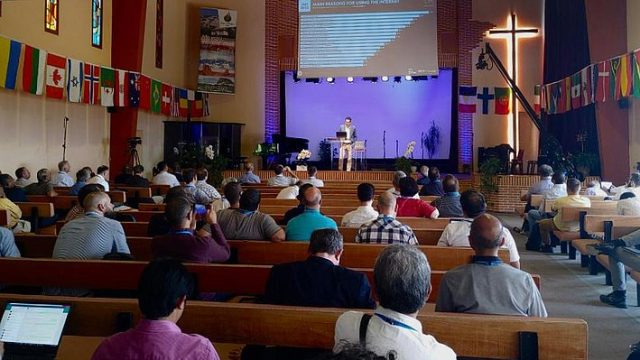Breaking Barriers

Calvin Rock, veteran author, academic, and administrator, is a retired vice president of the General Conference of Seventh-day Adventists and one of Adventism’s most respected voices on the issues this article engages. The item before you is part three of seven in Dr. Rock’s series on “The Radically Social Jesus.”
- It is also available as an audio file at: https://soundcloud.com/adventistworld/radically-social-jesus-cbrock-3 (7:56).
- Scroll to the end to find links to previous articles in this series as well as audio tracks.
- If you would prefer to consume the entire series at one-go, you may “binge-read” at https://www.adventistreview.org/radically-social-jesus.
- Listeners interested in accessing the entire audio series at one-go may access it at https://soundcloud.com/adventistworld/radically-social-jesus-cbrock-3 (47:28). —Editors
The Messiah didn’t spend His life in the steeple of Jewish isolationism, but down among the people in the highways and byways of Judea.
He studiously avoided Roman censure by discouraging the masses from labeling Him king, but He did not shrink from healing the sick, raising the dead, and other acts that indicated a physical power clearly superior to that of boastful Rome—all the while engaging in a social code that exposed its tyranny.
He condemned the class barriers of both Jews and Romans by association with the rich and poor; He indicted their racial barriers by open converse with Jewish, Samaritan, Syrophoenician, and Roman citizens; He denounced existing sex discrimination not only by elevating women in many of His miracles and parables, but by their inclusion in His traveling troop and by His personal relations with Martha and the several Mary’s of His life.
The extreme difference between His social bent and that of the political titans of His day is that He was not only radically different in His spiritual orientation and daily associations; He also was radically unlike them in His strategic assumptions:
- Their organizational purpose was control of others; His, “wholeness of others.”
- Their primary ends were exterior manifestations; His, “interior goodness.”
- Their primary requisite for acceptance was status and appearance; His, “character and surrender.”
- Their primary incentives to obedience were fear and force; His, “love and example.”
- Their primary relation to others was kingly power; His, “servant leadership.”
The Zealots tried to better conditions by armed insurrection. The Sadducees sought to alleviate suffering by compromise of belief and negotiation with their oppressors. The Pharisees sought relief by esoteric debate and pietistic flight from common duty. Jesus’ principle of service was demonstrably different: “the work of restoration.” He came to restore both our broken relationship with God and our improper relationships with one another; and, in fact, He told us that the former was not attainable without the latter. In other words, Jesus’ objectives involved not just the individual but the social aspects of society—not simply the vertical but the horizontal outreach of the cross that lay just ahead.
The pioneer leaders of early Seventh-day Adventism closely mirrored Jesus’ activist example. This is certainly instructive. They were not only priestly in their sympathies, but their prophetic address to social issues spoke boldly regarding the political issues and parties troubling the country. A list of these social-activist souls might include:
- Millerite preacher Charles Fitch (1815-1844), whom Ellen White in vision saw in heaven.1 Fitch attacked the issue of slavery, proclaiming, “Up my friends and do your duty, to deliver the spoils out of the hands of the oppressor, lest the fire of God’s fury kindle ere long upon you.”2
- John Byington (1798-1887), first General Conference president (1863-1865), who was an active abolitionist.3
- Uriah Smith (1832-1903), first General Conference secretary and early church author and Review editor, who attacked the religious leaders of his day for their contribution to the misery of America’s indentured slaves. He castigated them for what he said was the “white-washed villainy” of the many pulpits where support of slavery gave evidence of the draconic spirit of this nation.4
- James White (1821-1881), husband of the church prophet and first editor of the Review, the official church paper, used its pages to attack those who did not endorse freedom of the slaves as “laggards.” While admitting his position to be radical, White likened President Lincoln to the Pharaoh of ancient Hebrew incarceration. In the same vein, he wrote: “For the past ten years the Review has taught that the United States of America were a subject of prophecy, and that slavery is pointed out in the prophetic word as the darkest and damaging sin upon this nation—those of our people who voted at all at the last Presidential election, to a man voted for Abraham Lincoln. . . . We know not one man among Seventh-day Adventists who has the least sympathy for secession.”5
- Joseph Bates (1792-1872), who is listed, along with James and Ellen White, as one of the three individuals who founded the Seventh-day Adventist Church, also contributed in this vein, calling America “this land of liberty, this heaven-daring, soul-destroying, slave-holding, neighbor-murdering country.”6
- Ellen White (1827-1915), whose antipathy for oppression led her to brave existing convention, stated with dramatic resolve: “I know that that which I now speak will bring me into conflict. This I do not covet, for the conflict has seemed to be contentious of late years; but I do not mean to live a coward or to die a coward. . . . I must follow in my Master’s footsteps. It has become fashionable to look down upon the poor, and upon the colored race in particular. But Jesus, the Master, was poor, and He sympathizes with the poor, discarded, the oppressed, and declares that every insult shown to them is as if shown to Himself.”7
______________________
Did you miss part of this series? Click the links below to catch up!
- Part 1 (text): https://www.adventistworld.org/the-radically-social-jesus/
- Part 1 (audio): https://soundcloud.com/adventistworld/radically-social-jesus-cbrock-1
- Part 2 (text): https://www.adventistworld.org/the-radically-social-jesus-part-2/
- Part 2 (audio): https://soundcloud.com/adventistworld/radically-social-jesus-cbrock-2
1 Ellen G. White, Early Writings (Washington, D.C.: Review and Herald Pub. Assn., 1882), p. 17.
2 Ronald Numbers and Jonathan M. Butler, The Disappointed (Knoxville, Tenn.: University of Tennessee Press, 1993), p. 141.
3 SDA Encyclopedia, second revised edition (Hagerstown, Md.: Review & Herald Pub. Assn., 1996), vol. 10, p. 266.
4 The Advent Review and Sabbath Herald, June 17, 1862.
5 James White, “The Nation,” The Advent Review and Sabbath Herald, August 12, 1862.
6 SDA Encyclopedia, p. 170.
7 Ellen G. White, The Southern Work (Hagerstown, Md.: Review and Herald Pub. Assn, 1901), p. 10.








